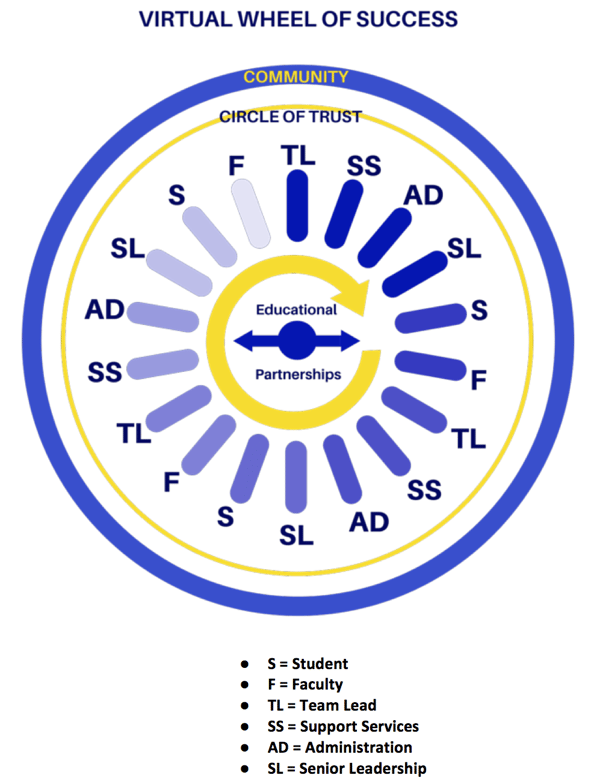Published on
No One Is an Island, But How Can We Build a Continent? (Part 4)

This is the final installment in a four-part series by Jamie Holcomb on the creation of engaging and inclusive faculty communities. In the last segment, Holcomb shed some light on what it takes to create virtual communities. In this series, Holcomb shares the Virtual Wheel of Success and reflects on what it will take to make this inclusive faculty community a reality.
Virtual Wheel of Success: Putting the Pieces Together
Putting the pieces together really means “building the continent.” What does it look like when fully established?
I created the Wheel of Success to help illustrate this because wheels were invented to help us move forward efficiently, effectively and, if well designed, without too many bumps to impede a pleasant journey.
A successful continent is established through the building of multiple layers. If looking at the wheel, the center, or the hub, is our educational partnerships. Earlier we created a definition for educational partnerships, which described these as an arrangement in which two or more individuals share the benefits and challenges of an educational endeavor.
In the Wheel of Success, the hub is a moving dial because educational partnerships should exist between any combination of stakeholders in education. The stakeholders in our wheel are the spokes and include students, faculty, team leads, support services, administration and senior leadership. Any and all combinations of these should work collaboratively through educational partnerships.
The sharing of information to and from should be fluid and it should be clearly established that we are all working together towards common goals. This builds trust and, as you will notice, the “circle of trust” encompasses all stakeholders. Trust is an essential component for any successful relationship and helps foster a culture of collaboration, which contributes to the final circle: the community.
Finally, as mentioned above, the development of community in an online space is possible and vital to the success of stakeholders. While we have primarily focused on our online educators in this paper, the development of a working, vibrant and successful online community will greatly contribute to the overall happiness of all stakeholders, which will in turn impact productivity. As we have discussed, this will likely impact success at all levels within the educational organization.
Believe It to Achieve It
In conclusion, after putting all the pieces together and considering the many strategies/approaches presented above, it is my opinion that in order to achieve it you must believe it. What do I mean? I feel that bringing people together to build the continent is more of a paradigm shift. It is, essentially, a new and totally holistic way of viewing, building and strengthening relationships throughout an organization. In order to achieve a cohesive, happy, and productive work community all aspects of this approach must be embraced to some extent.
I do not believe we can achieve the above with only one or two modifications to organizational interactions. It is important to note that positive changes develop over time and with constant care and attention. The product of these initiatives may not be seen immediately, but if time and energy are committed to the paradigm shift with all involved parties, the transition will occur and the results of the transition will be very rewarding for the organizational ecosystem.
– – – –
Series References
[1] “New Study Shows We Work Harder When We Are Happy.” University of Warwick News and Events. N.p., 21 Mar. 2014. Web. 30 Mar. 2016.
[2] Lorenzetti, Jennifer Patterson. “Adjunct by Choice: Getting Past the Stereotypes of Online Instructors – Faculty Focus | Higher Ed Teaching & Learning.” Faculty Focus Higher Ed Teaching Learning. N.p., 11 Mar. 2011. Web. 30 Mar. 2016. Nolan, V. (2011).
[3] Ibid
[4] Ibid
[5] Dolan, Vera L. B. “The Isolation of Online Adjunct Faculty and Its Impact on Their Performance.” The International Review of Research in Open and Distributed Learning 12.2 (2011): 62-77. Web. 31 Mar. 2016.
[6] Bozek, Agnieska, and Ryszard Stocki. “Mastery in Happiness – the Role of Expertise in Everyday Life.” ResearchGate. N.p., Apr. 2013. Web. 30 Mar. 2016.
[7] Zwilling, Martin. “How to Increase Productivity by Employee Happiness.” Forbes. Forbes Magazine, 2 Dec. 2014. Web. 21 Mar. 2016.
[8] Hall, Alena. “These 6 Things Will Make You Happier At Work.” The Huffington Post. TheHuffingtonPost.com, 11 July 2014. Web. 30 Mar. 2016. Lorenzetti, J. P. (2011, March 11).
[9] Shelley, Lisa. “Why Belonging Is Key in Today’s Workplace.” Switch Shift. N.p., 24 Nov. 2014. Web. 30 Mar. 2016.
[10] Ibid
Author Perspective: Administrator




